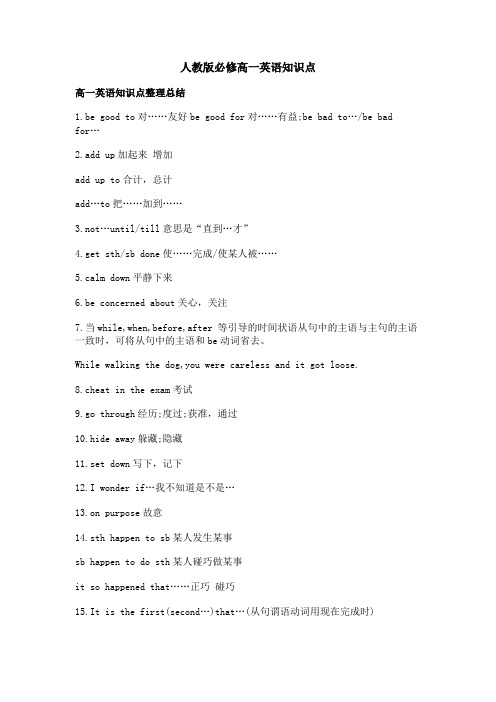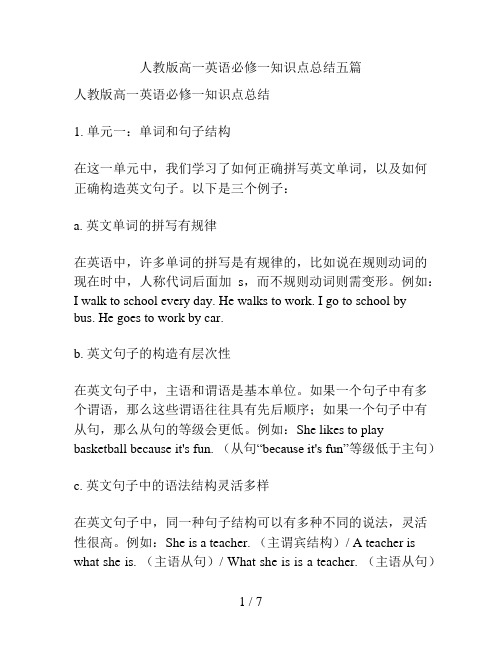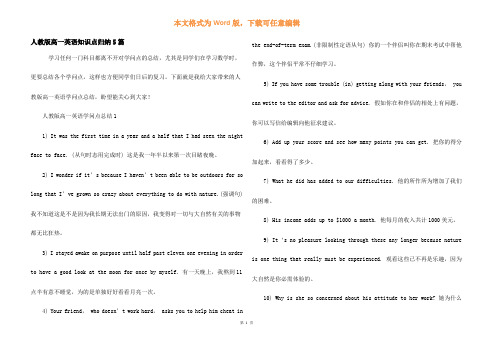高一人教版英语知识点归纳分享
(完整版)人教版高中英语必修一语法知识点总结

人教版必修一各单元知识点总结Unit One Friendship一、重点短语1.go through 经历,经受get through 通过;完成;接通电话2. set down 记下,放下3. a series of 一系列4. on purpose 有目的的5. in order to 为了6. at dusk 傍晚,黄昏时刻7. face to face 面对面8. fall in love 爱上9. join in 参加(某个活动);take part in 参加(活动)join 加入(组织,团队,并成为其中一员)10. calm down 冷静下来11. suffer from 遭受12. be/get tired of…对…感到厌倦13. be concerned about 关心14. get on/along well with 与…相处融洽15. be good at/do well in 擅长于…16. find it + adj. to do sth. 发现做某事是…17. no longer / not …any longer 不再…18. too much 太多(后接不可数n.)much too 太…(后接adj.)19. not…until 直到…才20. it’s no pleasure doing sth 做…并不开心21. make sb. sth. 使某人成为…make sb. do sth. 使某人做某事二、语法----直接引语和间接引语概念:直接引语:直接引述别人的原话。
一般前后要加引号。
间接引语:用自己的话转述别人的话。
间接引语在多数情况下可构成宾语从句且不要加引号。
例:Mr. Black said, “ I’m busy.”Mr. Black said that he was busy.变化规则(一)陈述句的变化规则直接引语如果是陈述句,变为间接引语时,用连词that(可省略)引导,从句中的人称、时态、指示代词、时间状语、地点状语都要发生相应的变化。
新人教版高一英语必修一知识点复习整理

新人教版高一英语必修一知识点复习整理1. 语法知识点
- 介词的用法
- 表示时间、地点和方式等
- 注意介词和动词的搭配
- 冠词的用法
- 不定冠词a和an的用法
- 定冠词the的用法
- 名词的单复数形式
- 一般名词的复数形式
- 不规则名词的复数形式
2. 词汇知识点
- 常用动词短语
- 与各种情境相关的常用动词短语
- 包括表示喜欢、讨厌、担心、希望等意思的动词短语
- 常用形容词及副词
- 描述人、事物特征的常用形容词
- 表示时间、程度、方式等的常用副词- 高频词汇
- 重点掌握高频出现的单词和常用短语3. 阅读技巧
- 预测文意
- 根据上下文预测单词或句子的意思
- 联系上下文理解文章
- 通过上下文的线索来理解全文意思
- 抓住文中关键信息
- 注意文章中的重点句子,理解文章主旨4. 写作技巧
- 语法正确性
- 注意动词时态和主谓一致
- 尽量避免语法错误
- 结构完整性
- 确保文章有开头、主体和结尾
- 逻辑连贯性
- 使用适当的连接词
- 使用连接词使句子和句子之间衔接紧密
以上是《新人教版高一英语必修一》的知识点复习整理,希望对你的学习有所帮助。
人教版高一英语必修一知识点总结

人教版高一英语必修一知识点总结人教版高一英语必修一知识点总结(一)1.preferPrefer doing …to doing…Prefer to do rather than do2.advantages /disadvantages 优势/劣势2.Ever since middle school, my sister Wang Wei and I have dreamed about taking a great bike trip. 从高中起,我姐姐王维和我就一直梦想做一次伟大的自行车旅行。
连词since 引导的时间状语从句用一般过去时,介词since 与时间点连用It is/has been+一段时间+since+一般过去时自从……至今已经多久了。
3. persuade sb to do sth= persuade sb into doing sth 说服某人做某事4. 强调句型 It is/was+被强调部分+that/who强调句型可以强调除谓语动词以外的任何句子成份。
一般来说,如果被强调部分是人时,用连词that或who;如果被强调部分是物,只能用连词that。
not … until 的强调句5.be fond of 喜欢,喜爱6. Although 尽管,虽然,引导让步状语从句① although 从句多在句首, though 从句可在主句前、中、后任何位置,而且though 可以作副词用于句末,作“但是,不过”讲,而although 无此用法。
② as though(仿佛,好像),even though(即使,尽管)中不能用although。
③ though 引导的让步状语从句可以倒装(将表语、状语、情态动词后的动词原形前置到句首,此用法同as),而 although 不可以。
7. insist on doing sth/ sth. 一定要、坚持主张She insists on getting up early and playing her radio loudly.她老是一大早起来把收音机音量开大11.care about 关心在乎care for 喜欢,照料,照顾12.change ones mind 改变主意13. experience 经历/经验14. Once 可作为从属连词,作“一(旦)……就……”解,连接一个表示时间的状语从句。
人教版必修高一英语知识点

人教版必修高一英语知识点高一英语知识点整理总结1.be good to对……友好be good for对……有益;be bad to…/be bad for…2.add up加起来增加add up to合计,总计add…to把……加到……3.not…until/till意思是“直到…才”4.get sth/sb done使……完成/使某人被……5.calm down平静下来6.be concerned about关心,关注7.当while,when,before,after 等引导的时间状语从句中的主语与主句的主语一致时,可将从句中的主语和be动词省去。
While walking the dog,you were careless and it got loose.8.cheat in the exam考试9.go through经历;度过;获准,通过10.hide away躲藏;隐藏11.set down写下,记下12.I wo nder if…我不知道是不是…13.on purpose故意14.sth happen to sb某人发生某事sb happen to do sth某人碰巧做某事it so happened that……正巧碰巧15.It is the first(second…)that…(从句谓语动词用现在完成时)16.in one’s power处于……的控制之中17.It’s no pleasure doing…做…没有乐趣It’s no good/use doing sth.做某事是没好处/没用的18.She found it difficult to settle and calm down in the hiding place.it做形式宾语19.suffer from患…病;遭受20.so…that…/such…thay…21.get tired of…对…感到劳累疲惫22.have some trouble with sb/sth.在……上遇到了麻烦23.get along with sb/sth.与某人相处高一年级英语知识点总结介词in, on, under等+名词构成介词短语表被动意义表示方位的介词与含动作意义的名词合用,含被动之义,其意义相当于该名词相应动词的被动形式,名词前一般不用冠词。
人教版高一英语必修一知识点总结五篇

人教版高一英语必修一知识点总结五篇人教版高一英语必修一知识点总结1. 单元一:单词和句子结构在这一单元中,我们学习了如何正确拼写英文单词,以及如何正确构造英文句子。
以下是三个例子:a. 英文单词的拼写有规律在英语中,许多单词的拼写是有规律的,比如说在规则动词的现在时中,人称代词后面加s,而不规则动词则需变形。
例如:I walk to school every day. He walks to work. I go to school by bus. He goes to work by car.b. 英文句子的构造有层次性在英文句子中,主语和谓语是基本单位。
如果一个句子中有多个谓语,那么这些谓语往往具有先后顺序;如果一个句子中有从句,那么从句的等级会更低。
例如:She likes to play basketball because it's fun. (从句“because it's fun”等级低于主句)c. 英文句子中的语法结构灵活多样在英文句子中,同一种句子结构可以有多种不同的说法,灵活性很高。
例如:She is a teacher. (主谓宾结构)/ A teacher is what she is. (主语从句)/ What she is is a teacher. (主语从句)2. 单元二:课文阅读在这一单元中,我们学习了如何正确理解英文课文的内容,并提高了对英文阅读的兴趣和能力。
以下是三个例子:a. 英文课文中的语言运用丰富多样英文课文中的语言运用很丰富,包括比喻、暗示、转喻等等,需要我们认真阅读并理解。
例如:The sky was a bright shade of blue. (比喻)/ Her words cut him like a knife. (转喻)b. 英文课文中的句式多种多样英文课文中的句式也很多样,有短句和长句、简单句和复合句等等。
我们需要慢慢地理解它们,并掌握如何从中获取信息。
高中英语(新人教版)必修一知识点归纳

高中英语必修一知识点归纳Welcome Unit知识点归纳Part one Vocabulary1. exchange n.交换;交流vt.交换;交流;交易;兑换In exchange (for...)作为(与......的)交换exchange student 交换生exchange A for B 以A交换B:把A兑换成B exchange sth. with sb. 与某人交流/交换某物exchange opinions/ideas/views交流意见/想法/看法2. design1) n. 设计;图案;构思;打算,意图。
make designs for 为......做设计by design(=on purpose)故意地2) vt.设计,构思;计划;意欲。
design sth. for... 为...设计某物be designed to do... 旨在做...,用于做...3. anxious adj. 焦虑的;不安的be anxious for sb./ about sth. 为某人/某事担心be anxious for...渴望...be anxious (for sb.) to do sth. 渴望(某人)做某事be anxious that... 渴望...4. annoyed adj. 恼怒的;生气的be annoyed with sb.生某人的气be annoyed at/about sth.因某事生气be annoyed to do做...感到生气5. senior adj. 级别(或地位)高的n. 较年长的人senior high (school)高中be senior to sb. 比某人的地位/职位高6. impress vt. 使钦佩;给……留下深刻的好印象vi. 留下印象;引人注目have a(n) ...impression of... 对······有······印象leave/make a(n) ...impression on sb. 给某人留下······印象(be) under the impression that... 以为······,(通常指)误认为······7. concentrate on 集中精力于8. leave...alone 不打扰,不惊动9. explore vt.& vi. 探索;勘探exploration n. 探索,探测explorer n. 探险者;勘探者;考察者10. confident adj. 自信的;有把握的be confident about 对......有信心be confident of (doing) sth.对(做)······有把握be confident that... 确信······11. look forward to 盼望;期待12. organise vt. 组织;筹备;安排;组建vi. 组建;成立organisation n. 组织;团体;机构Part two Grammar句子成分和基本句型一、句子成分构成句子的各个部分叫作句子成分。
人教版高一英语知识点归纳5篇

人教版高一英语知识点归纳5篇学习任何一门科目都离不开对学问点的总结,尤其是同学们在学习数学时,更要总结各个学问点,这样也方便同学们日后的复习。
下面就是我给大家带来的人教版高一英语学问点总结,盼望能关心到大家!人教版高一英语学问点总结11) It was the first time in a year and a half that I had seen the night face to face. (从句时态用完成时) 这是我一年半以来第一次目睹夜晚。
2) I wonder if it’s because I haven’t been able to be outdoors for so long that I’ve grown so crazy about everything to do with nature.(强调句) 我不知道这是不是因为我长期无法出门的原因,我变得对一切与大自然有关的事物都无比狂热。
3) I stayed awake on purpose until half past eleven one evening in order to have a good look at the moon for once by myself. 有一天晚上,我熬到11点半有意不睡觉,为的是单独好好看看月亮一次。
4) Your friend, who doesn’t work hard, asks you to help him cheat in the end-of-term exam.(非限制性定语从句) 你的一个伴侣叫你在期末考试中帮他作弊,这个伴侣平常不仔细学习。
5) If you have some trouble (in) getting along with your friends, you can write to the editor and ask for advice. 假如你在和伴侣的相处上有问题,你可以写信给编辑向他征求建议。
人教版高一英语知识点总结归纳5篇分享

人教版高一英语知识点总结归纳5篇分享高一英语在整个中学英语中占有特别重要的地位,既是高一又是整个中学阶段的重难点,所以要保持良好的学习心态和正确的学习方法。
下面就是我给大家带来的人教版高一英语学问点总结,盼望能协助到大家!人教版高一英语学问点总结11. be good to 对……友好be good for 对……有益;be bad to…/be bad for…2. add up 加起来增加add up to 合计,总计add… to 把……加到……3. not…until/till 意思是“直到…才”4. get sth/sb done 使……完成/使某人被……5. calm down安静下来6. be concerned about 关怀关注7. 当while, when, before, after 等引导的时间状语从句中的主语与主句的主语相同时,可将从句中的主语和be动词省去。
While walking the dog, you were careless and it got loose.8. cheat in the exam9. go through 经验;度过;获准,通过10. hide away 躲藏;隐藏11. set down 写下,登记12. I wonder if….. 我不知道是不是….12. on purpose 存心13. sth happen to sb 某人发生某事sb happen to do sth 某人碰巧做某事it so happened that ……正好碰巧14. It is the first (second…) that… (从句谓语动词用此时此刻完成时)15. in one’s power 处于……的限制之中16. It’s no pleasure doing…. 做…..没有乐趣It’s no good/ use doing sth. 做某事是没好处/没用的17. She found it difficult to settle and calm down in the hiding place. it做形式宾语18. suffer from 患…病;遭遇19. so…that… /such…thay…20. get tired of…. 对…感到劳累疲倦21. have some trouble with sb/sth. 在……上遇到了麻烦22. get along with sb/sth. 与某人相处23. ask(sb)for advice. (向某人)征求建议24. make 后接复合宾语,宾语补足语须用不带to 的不定式、形容词、过去分词、名词等。
- 1、下载文档前请自行甄别文档内容的完整性,平台不提供额外的编辑、内容补充、找答案等附加服务。
- 2、"仅部分预览"的文档,不可在线预览部分如存在完整性等问题,可反馈申请退款(可完整预览的文档不适用该条件!)。
- 3、如文档侵犯您的权益,请联系客服反馈,我们会尽快为您处理(人工客服工作时间:9:00-18:30)。
高一人教版英语知识点归纳分享
人教版高一英语知识点总结1
重点短语
1. be fond of爱好
2. treat…as…把……看作为……
3. make friends with 与……交朋友
4. argue with sb. about / oversth. 与某人争论某事
5. hunt for寻找
6. in order to为了
7. share…with与……分享
8. bring in引进;赚钱
9. a great / good many许多…
_. have difficulty (in) doing做……有困难
_. end up with以……结束
_. e_cept for除……之外
_. come about发生
_. make(a)fire生火
_. make yourself at home别拘束
_. the majority of大多数
_. drop sb. a line给某人写短信
_. for the first time第一次
_. at all根本;竟然
_. have a (good) knowledge of…精通……
☆交际用语☆
1. i think…
i like / love / hate...
i enjoy...
my interests are...
2. did you have a good flight?
you must be very tired.
just make yourself at home.
i beg your pardon?
can you tell me how to pronounce...?
get it.
人教版高一英语知识点总结2
核心单词
persuade
vt.说服;劝服;使相信(同convince)
常用结构:
persuade sb. of sth. 使某人相信某事
persuade sb. to do sth. 说服某人做某事
persuade sb. into doing sth. 说服某人做某事
persuade sb. out of doing sth. 说服某人不要做某事
persuade sb. that-clause 使某人相信……
联想拓展
talk sb. into/out of doing sth.=reason sb. into/out of doing sth. 说服某人做/不做某事
trick sb. into/out of doing sth. 诱使某人做/不做某事
urge sb. into/out of doing sth. 怂恿某人做/不做某事
易混辨析
advise/persuade
advise
强调劝告,建议的动作,不注重结果;而persuade强调已经说服 ,重在结果.用法上:advise可跟v.-ing形式作宾语,也可以接that-clause
(that sb. should do),而persuade则不能.
I persuaded him of its truth. 我使他相信这是真的.
We will persuade him to take the medicine.
我们将说服他把药吃下去.
We persuaded her into taking the job.
我们说服她接受了这份工作.
I persuaded my father out of smoking.
我劝服父亲戒了烟.
人教版高一英语知识点总结3
副词的排列顺序:
1) 时间,地点副词,小单位的在前,大单位在后.
2) 方式副词,短的在前,长的在后,并用and或but等连词连接.
Please write slowly and carefully.
3) 多个不同副词排列:程度+地点+方式+时间副词.
注意:副词very 可以修饰形容词,但不能修饰动词.
改错:(错) I very like English.
(对) I like English very much.
注意:副词enough要放在形容词的后面,形容词enough放在名词前后都可. I don t know him well enough.
There is enough food for everyone to eat.
There is food enough for everyone to eat.
人教版高一英语知识点总结4
一.将来完成进行时
1.概念:表示动作从某一时间开始一直延续到将来某一时间.是否继续下去,要视上下文而定.
2.基本结构:shall/will have been doing
3.例子:I shall have been working here in this factory for twenty years by the
end of the year.到今年年底,我将在这个工厂工作_年了.
If we don t hurry up the store will have been closing before we get there.
咱们如不快一点儿,等我们到了那儿,店门就会关了.
二. 过去将来完成进行时
1.概念:表示从过去某时看至未来某时以前会一直在进行的动作.
2.基本结构:should/would + have + been +现在分词
3.例子:He told me that by the end of the year he would have been living there
for thirty years.他告诉我,到年底时,他就在那住了30年了.
高中英语必修三语法知识
使用被动语态应注意的几个问题:
1. 不及物动词无被动语态.
What will happen in 1_ years.
The dinosaurs disappeared about 65 million years ago.
2. 有些动词用主动形式表示被动意义.
This pen writes well.
This new book sells well.
3. 感官动词或使役动词使用省略to的动词不定式,主动语态中不带to ,但变为被动语态时,须加上to . 例:make somebody do
something→somebody+ be +made t o do something
see somebody do something→somebody +be +seen to do something
A girl saw my wallet drop when she passed by.→My wallet was seen to drop by
a girl when she passed by. The boss made the little boy do heavy work.→The little boy was made to do heavy work by the boss.
4. 如果是接双宾语的动词改为被动语态时,直接宾语(物)作主语,那么动词后要用介词,这个介词是由与其搭配的动词决定.
He gave me a book.→A book was given to me by him.
He showed me a ticket.→A ticket was shown to me by him.
My father bought me a new bike. →A new bike was bought for me by my
father.
人教版高一英语知识点总结5
in the end, finally, at last
三者均可表示〝(经过周折.等待.耽误)最后,终于〞之意.
不同的是:
finally 一般用在句中动词前面,而 at last 与 in the end 的位臵则较为灵活;
三者中at last 语气最为强烈,且可单独作为感叹句使用.
After putting it off three times, we finally managed to have a holiday in
Dalian.
At last he knew the meaning of life.
At last! Where on earth have you been?
But in the end he gave in.
另外,finally还可用在列举事项时,引出最后一个内容,相当于lastly.
Firstly, we should make a plan; secondly, we should carry it out; finally
we should make a conclu- sion.
高一人教版英语知识点归纳分享。
